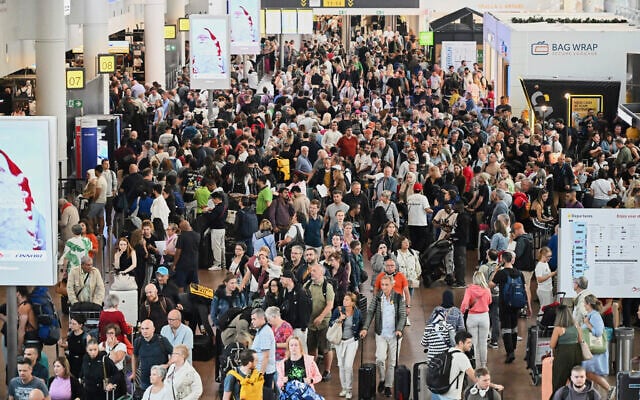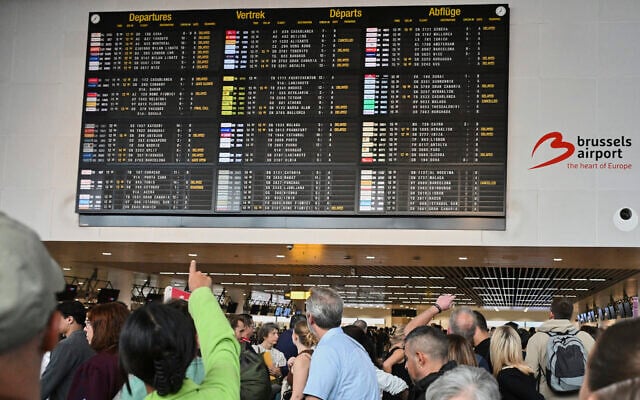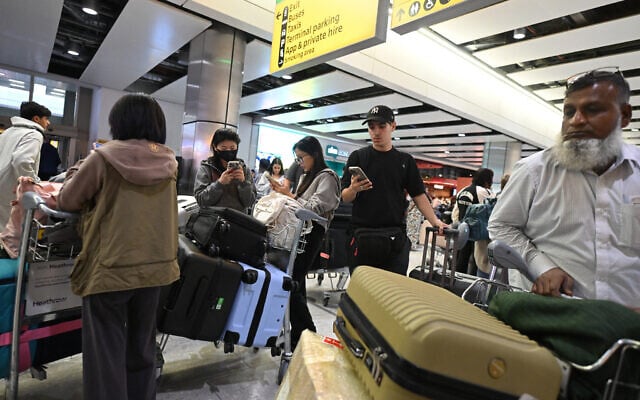Reuters — A cyberattack at a provider of check-in and boarding systems disrupted operations on Saturday at several major European airports, including London’s Heathrow, the continent’s busiest, causing flight delays and cancellations.
The disruption is the latest in a string of hacks targeting governments and companies across the world, hitting sectors from healthcare and defense to retail and autos. A recent breach at luxury carmaker Jaguar Land Rover brought its production to a halt.
Saturday’s problems were centered on MUSE software made by Collins Aerospace, which provides systems for several airlines at airports globally, the airports said.
RTX, Collins Aerospace’s parent company, said it was aware of a “cyber-related disruption” to the software at selected airports, without naming them.
Heathrow Airport said it was among those affected. Brussels Airport and Berlin Airport were also affected, they said separately. Hours later, Dublin Airport said it was also facing minor impact from the issue, along with Cork Airport, Ireland’s second biggest after Dublin.
Electronic check-in impacted
“The impact is limited to electronic customer check-in and baggage drop and can be mitigated with manual check-in operations,” RTX said in an emailed statement, adding that it was working to fix the issue as quickly as possible.
It did not give any information on who might be behind the attack.

People walk by a departures board after a cyberattack caused delays at Brussels International Airport in Zaventem, Belgium, September 20, 2025. (AP Photo/Harry Nakos)
At Heathrow, Berlin and Brussels, 29 flight departures and arrivals had been canceled as of 1130 GMT, aviation data provider Cirium said. In total, 651 departures were scheduled from Heathrow, 228 from Brussels and 226 from Berlin on Saturday.
Officials in Brussels said there had been four flight diversions, as well as “delays on most of the departing flights.”
Brussels Airport said it had asked airlines to cancel half of their scheduled departing flights on Sunday to avoid long queues and late cancellations, signaling that the disruption would continue through the weekend.
A European Commission spokesperson said there were currently no indications of a “widespread or severe attack” and that the origin of the incident was still under investigation.
These kinds of sweeping outages are typically the result either of ransomware attacks, where online extortionists paralyze corporate networks in the hope of payment, or deliberate digital sabotage.

An airport employee points at a departure board after a cyberattack caused delays at Brussels International Airport in Zaventem, Belgium, September 20, 2025. (AP Photo/Harry Nakos)
Rafe Pilling, director of threat intelligence at cybersecurity company Sophos, said the impact of the incident highlighted “the fragile and interdependent nature of the digital ecosystem underpinning air travel.”
“We’ve seen huge impact across retail and currently automotive in the UK this year,” he said. “The threat is significant and very real.”
Several breach-tracking websites have previously said that Collins Aerospace was hit by ransom-seeking hackers in 2023. The company did not return a message seeking comment on those allegations or details about Saturday’s incident.
Passengers left in the dark
Passengers with a flight scheduled for Saturday were advised by the affected airports to confirm their travel with airlines before heading to the airport.
Berlin Airport said on its website that there were longer waiting times at check-in and it was working on a quick solution. Frankfurt Airport, Germany’s largest, was not affected, a spokesperson said.

Travelers wait in the terminal at Heathrow Airport, west of London on September 20, 2025, amid disruptions caused by a cyberattack. (Photo by JUSTIN TALLIS / AFP)
“I arrived here at the airport station at about quarter past nine, and we haven’t been told anything except that there was a technical fault,” Kim Reisen told Reuters at Berlin Airport. “Of course, online, you can read that it was probably a cyberattack, and now we’re waiting here to see what happens.”
Another traveler, Siegfried Schwarz, said such an attack was “incomprehensible.”
“I also find it inexplicable that, with today’s technology, there’s no way to defend yourself against something like that.”
EasyJet, among Europe’s biggest airlines, said it was operating as normal and did not expect the issue to impact its flights for the rest of the day.

Passengers queue at check-in counters at Terminal 1 of Berlin Brandenburg BER airport Willy-Brandt in Schoenefeld, southeast of Berlin, on September 20, 2025, after major European airports were hit by “cyber-related disruption” affecting automated check-in and baggage drop systems and causing delays. (Photo by Tobias SCHWARZ / AFP)
Ryanair and British Airways owner IAG did not immediately respond to requests for comment.
US carrier Delta Air Lines said it expected minimal impact, adding it had implemented a workaround to minimize disruption. United Airlines said the issue was “causing minor departure delays,” but it had not canceled any flights.
British transportation minister Heidi Alexander said she was receiving regular updates on the situation.
British and German cyber defense authorities said they were in touch with their respective airports over the matter.



